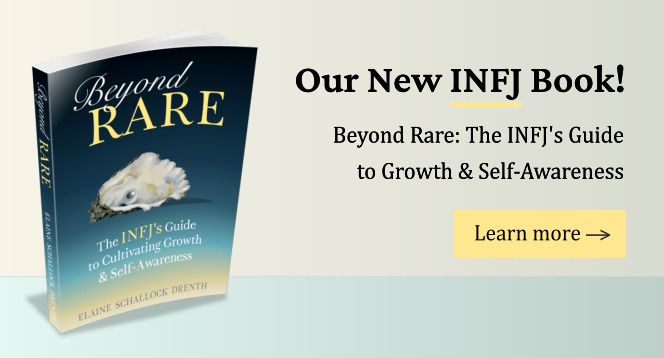By Cheryl Florus
Besides emotions that seem mellow in nature, the INFJ, like any other person, also experience emotions with a higher intensity level. But, because of the INFJ’s lack of cognitive functions which can serve as an efficient internal emotional processing system, intense emotions of happiness and joy, but also intense frustration, anger and sadness are hard to downplay or save for later examination. If something happens that upsets or excites INFJs in a substantial way, the intense emotions which follow can take over their state of mind. This can create a feeling of losing control and being possessed. In extreme cases releasing inhibitions which are necessary to maintain external harmony. In an attempt to relieve the inner tension, INFJs will feel an urge to express themselves in the moment, verbally or physically, positively or negatively. But verbal, or in extreme cases, physical, expression of an intense emotion, will only occur in the moment if the emotion reaches a certain level of intensity, when the INFJ feels they can´t control it any longer. At this stage, the inner makings of Ni will be distorted by emotional turmoil, making it´s observance more difficult, while the intense emotions force their way out through Fe. This stands in contrast to less intense consciously experienced emotions, which the INFJ will not necessarily feel the need to express in the moment, but rather save for those in the INFJ’s trusted circle, where Ni finds the conscious use of their Fe appropriate.

INFJ Strategies for Handling Emotions
Negative emotions are obviously harder to deal with than positive ones, but there are certain pitfalls the INFJ should look out for when expressing positive emotions. When expressing their feelings, their positive state of mind can easily be knocked down by others’ critique, as they easily pick up on others’ energy. Although their Ni usually senses whether such critique comes from genuine concern or envy, and their Ti can weigh arguments to a certain extent, their emotions will still be affected. Even when the INFJ rationally knows the critical comments are not justified. This is because of the inability to independently manage their emotions efficiently, as I discussed earlier. And when they get immersed in the negative emotions caused by the critical comments, unable to handle such emotions, they will likely start doubting the validity of their formerly joyful experience. So how should they handle a situation like this?
This is a bit of a dilemma, because when the INFJ communicates a joyful experience to someone, and that person has a positive response, the INFJ will pick up on that positive emotional energy using their Se and Fe, and thus reinforce the already positive state of mind, like throwing oil onto fire – the response of the other person being the oil. Note how, in the case of emotional turmoil, Ni and Ti do not function properly, as intense emotions are not converted and scaled sufficiently before they are processed by these functions. So in case of intense emotions, their reasoning and conclusions can produce an outcome that can seem exaggerated, when compared to the reality of the situation in question. In case of a positive response from the other person, this can feel like a good thing to the INFJ, who will experience a natural high because of their oil-on-fire emotional processing. But this same principle can backfire when they are criticized, leaving the INFJ feeling unhappy. And the effect will be larger in INFJ’s who have low self-esteem or a depression, because positive emotions (about themselves) can seem disproportionally big compared to their depressed emotional baseline, making the fall back to that baseline or lower feel even more devastating. So INFJ’s may choose to share their experience, with the risk of being criticized and subsequently feeling unhappy, or choose to keep their intense emotions to themselves, which they may find hard to do. There is a secure middle way, which entails sharing their positive experience only with those who they absolutely know will cheer them on, no matter what. Or, in the unfortunate case of having no such person available, writing them down in a positivity journal. But these methods might feel a bit restrictive. Another option would be to communicate their positive emotions freely as they see fit, and having a reality check when encountering negative feedback.
I think it´s important to remember for INFJ´s that the intense emotions they may experience from time to time rarely reflect reality. But, one may ask, who would want to face dry reality when overcome with intense joy? There certainly are situations in which this is desirable. And in the case of intense negative emotions, whether they arise after critical comments or otherwise, having a reality check can be essential for re-establishing emotional balance. I will discuss this further in Part III.
Learn more about INFJs—their personality, relationships, life struggles, paths to growth, and much more—in our new INFJ book:
Beyond Rare: The INFJ’s Guide to Growth & Self-Awareness
Related Posts:
INFJ Strategies for Dealing with Emotions: Part I | Part III
